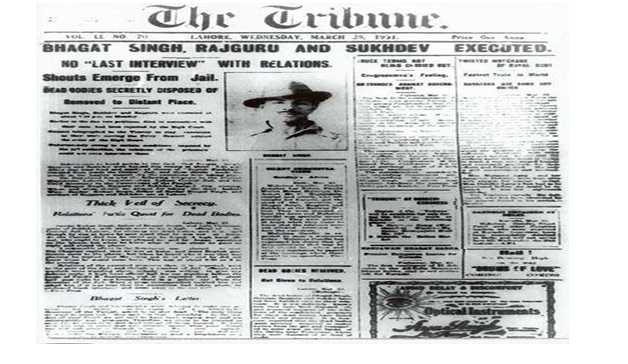The Relevance of Bhagat Singh Today

LUCKNOW: The call of the hour is to wake up wide to one's revolutionary responsibilities. The call is in memory of the revolutionary zeal of 23 year old Bhagat Singh who was hanged in 1931 in a Lahore jail. The greatest challenge today is to make sure that the country's institutions live up to democratic principles and to beware of the tyranny by the majority.
Bhagat Singh's life is inspiring as India today struggles to put into practice the principle that rights of all citizens are respected including those of the majority and of the minority.
As a willful majority rule rolls out an agenda for a religiously inspired state, it is time to recall Bhagat Singh's recognition of religion to arouse the spirit of patriotism but also its strength to fuel hate for another's religion.
In the face of elected bigotry, a threat looms large over the functioning of democracy today and of tyranny by the majority. After all the majority that makes the laws, can also break them, is the fear. Along with political tyranny by the majority there is fear of social and cultural tyranny along with attempts to stifle minority voices and an imposed regimentation of thought and values. Then what?
The challenge is how to get the majority to act according to principles so no community in the country is insulated, discriminated against and is deprived of economic opportunities that will only reinforce a sense of social alienation among a large number of young people. It is solace thatBhagat Singh was able to shrug off the influence of religion from his psyche through criticism of the self, and deep self-examination.
He had little time for Hindu ideas of Ramrajya or the promise by Muslim wise men of paradise. During his brief life, Bhagat Singh got rid of religious influences of an Arya Samaj family by working on himself. It can only be imagined what Bhagat Singh might have said about the kind of nationalism that is celebrated by many in India today?
The lesson left to humanity by Bhagat Singh's short and sweet life is to never ignore the exploitation of the already poor by the wealthy, influential and the powerful. Young as he was Bhagat Singh had kept a critical touch with the self. He had encouraged his social and political consciousness to keep transforming for the better. His focus was on the education and enlightenment of the youth for a revolutionary transformation and for political mobilisation against the exploitation of any one person by another.
Bhagat Singh may be remembered for two violent incidents when he avenged the death of Lala Lajpath Rai by killing JP Saunders, a British police official and for throwing a bomb in the Central Legislative Assembly but if he had lived longer he would have given up violence, say scholars. As he had gained deeper insight into his ideals, Bhagat Singh saw revolution simply as a longing for a change for the better.
He was critical of people and societies that become habitual to what is, and tend to shrink in fear at any thought of change. Bhagat Singh believed that it is this uncritical and lazy spirit of human beings that needs to wake up to realise all that which is most important in life to individuals and to communities. The awakening of the human spirit to greater ideas is what revolution meant to Bhagat Singh.
Jawaharlal Nehru could not help but admire the spirit of Bhagat Singh. He had hoped that Bhagat Singh's Naujawan Bharat Sabha would grow in strength to take a leading part in forming a modern India. Recognising his popularity amongst the youth, Nehru said that Bhagat Singh was a clean fighter who faced his enemy in the open field. He was a young boy full of burning zeal for the country. He was like a spark which became a flame in a short time and spread from one end of the country to the other dispelling the prevailing darkness everywhere.
Subhas Chandra Bose recognised Bhagat Singh as a symbol of awakening among the youth. Although Bhagat Singh was opposed to some of Gandhiji's views, he had great respect for the Mahatma.
Today it is important to remember that when Slobodan Milosevic murdered hundreds of thousands in the name of a Greater Serbian nation, he was eventually halted by NATO military campaigns. However with international organisations having lost much teeth, the USA president busy targeting sections of his own population and Europe finding it difficult to manage ethnic and other minority groups on the continent, abuse by majorities is a grave worry.
It is no longer certain if international law is still strong enough to implement conventions on prevention and punishment of crimes of genocide. The United Nations international covenant on civil and political rights reads great on paper where Article 27 asserts that persons belonging to ethnic, religious, or linguistic minorities shall not be denied the right in community with the other members of their group to enjoy their own culture, to profess and practice their own religion, or to use their own language and there are other laws that further define protections for ethnic, religious, and cultural minorities to preserve their culture, languages, and beliefs and to protect themselves from discrimination.
While all these treaties establish clear international moral standards and have improved conditions for minorities in many places, the actual practice of protecting minorities from targeted repression remains a real danger.



